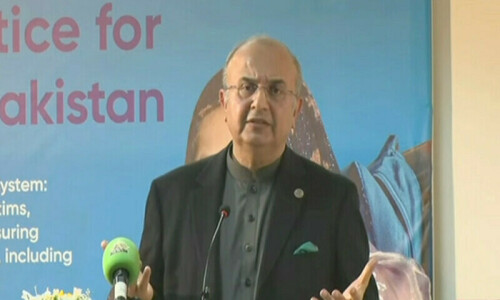The Supreme Court’s senior puisne judge Justice Mansoor Ali Shah has expressed concern that the country’s judiciary is undergoing “one of its weakest moments in our history” and thus risking executive overreach in its affairs, it emerged on Friday.
The remarks come in the backdrop of the 26th Constitutional Amendment which was criticised for the haste with which it was passed. The International Court of Jurists derided the “blow to judicial independence” when the 26th Amendment was signed into law.
Some of the major changes made to the Constitution included changing the process of the chief justice of Pakistan’s appointment, taking away the high courts’ suo motu powers, formation of constitutional benches, and performance evaluations of high court judges.
The Judicial Commission of Pakistan (JCP) had last week approved the formation of a committee led by Justice Jamal Khan Mandokhail to constitute rules and criteria for appointing judges by December 15.
In a letter written to Justice Mandokhail a day ago regarding the task ahead, seen by Dawn.com, Justice Shah said: “The judiciary of Pakistan is passing through one of its weakest moments in our history, and the risks of executive overreach are higher than ever.”
He said he had “deep concern” regarding the formulation of rules for the appointment of judges to constitutional courts in Pakistan, a matter which he called of the “utmost significance to the independence of the judiciary, the rule of law and democracy in our country” since it was mandated upon the JCP by the Constitution.
“In the absence of such rules, any proceedings undertaken by the commission for the appointment of judges would be unconstitutional,” the senior puisne judge pointed out.
Justice Shah said the judiciary had enjoyed primacy in the appointment process of judges but the vital balance was “fundamentally disturbed” under the 26th amendment, granting a majority to the executive in the JCP.
“This unprecedented shift in the composition of the JCP poses grave risks, including the potential for political appointments and the packing of courts with judges lacking an ideological commitment to the rule of law,” the judge warned.
He stressed that appointments made without a “well-defined and transparent framework of rules” would undermine public confidence in the judiciary, compromise its independence, and erode its ability to function as a neutral arbiter of justice.
“The selection and appointment of judges must be structured and well-reasoned and never be left vulnerable to arbitrary or politically motivated decisions.
“In these circumstances, it becomes imperative that well-thought-out rules are framed that provide the necessary filters to select the best of the best, thereby safeguarding judicial independence and ensuring merit-based selections.”
He urged the five-member committee tasked with drafting the rules that selecting the best judges that would promote the rule of law required a focus on objective, fair and forward-looking criteria.
Justice Shah proposed several criteria and factors that he said potential nominees should be judged for.
“By adopting this comprehensive approach, the JCP can ensure a fair, robust and merit-based selection process that aligns with the principles of judicial independence and rule of law.
“The absence of robust rules and criteria will allow outside influence to undermine the judiciary by facilitating appointments that serve partisan interests rather than upholding constitutional values,” he pointed out.
The judge stressed that it was critical that “no appointment to the constitutional courts proceeds until these rules are finalised and adopted by the JCP”, saying that the approach was essential not only for ensuring the independence of the judiciary but also for enhancing public trust in the courts as “bastions of justice, the rule of law and democratic accountability”.
“Any hurriedness in the matter by the JCP can seriously undermine and weaken the judiciary for years to come,” Justice Shah warned.
He concluded by expressing trust that Justice Mandokhail would “recognise the urgency and importance of this matter and act decisively to ensure that the process is both fair and resistant to outside influence”.
The JCP will meet on Dec 21 to consider 10 nominations for four vacant positions of the Islamabad High Court judges.
Justice Shah said he looked forward to the draft rules in the Dec 21 meeting. “I understand that unless the rules are finalised by the JCP, we cannot initiate the process of appointment of judges,” he added.
















































